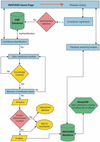INFEVERS: the Registry for FMF and hereditary inflammatory disorders mutations
- PMID: 12520003
- PMCID: PMC165478
- DOI: 10.1093/nar/gkg031
INFEVERS: the Registry for FMF and hereditary inflammatory disorders mutations
Abstract
We have established the INFEVERS--INternet periodic FEVERS--website (which is freely accessible at http://fmf.igh.cnrs.fr/infevers/). Our objectives were to develop a specialist site to gather updated information on mutations responsible for hereditary inflammatory disorders: i.e. Familial Mediterranean Fever (FMF), TRAPS (TNF Receptor 1A Associated Syndrome), HIDS (HyperIgD Syndrome), MWS (Muckle-Wells Syndrome)/FCU (Familial Cold Urticaria)/CINCA (Chronic Infantile Neurological Cutaneous and Articular Syndrome). Contributors submit their novel mutations through a 3 step form. Depending on the disease concerned, a member of the editorial board is automatically solicited to overview and validate new submissions, via a special secured web interface. If accepted, the new mutation is available on the INFEVERS web site and the discoverer, who is informed by email, is credited by having his/her name and date of the discovery on the site. The INFEVERS gateway provides researchers and clinicians with a common access location for information on similar diseases, allowing a rapid overview of the corresponding genetic defects at a glance. Furthermore, it is interactive and extendable according to the latest genes discovered.
Figures
References
-
- McDermott M.F. and Frenkel,J. (2001) Hereditary periodic fever syndromes. Neth. J. Med., 59, 118–125. - PubMed
-
- Drenth J.P. and van der Meer,J.W. (2001) Hereditary periodic fever. N. Engl. J. Med., 345, 1748–1757. - PubMed
-
- The French FMF Consortium (1997) A candidate gene for familial Mediterranean fever. Nature Genet., 17, 25–31. - PubMed
-
- The International FMF Consortium (1997) Ancient missense mutations in a new member of the RoRet gene family are likely to cause familial Mediterranean fever. Cell, 90, 797–807. - PubMed
MeSH terms
LinkOut - more resources
Full Text Sources
Other Literature Sources
Medical


